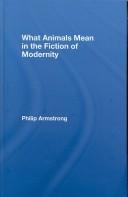| Listing 1 - 3 of 3 |
Sort by
|

ISBN: 9780415358385 9780415358392 9780203004562 0415358396 0415358388 0203004566 9781134245130 9781134245178 9781134245185 1134245181 1281197599 9786611197599 9781281197597 Year: 2008 Publisher: London New York
Abstract | Keywords | Export | Availability | Bookmark
 Loading...
Loading...Choose an application
- Reference Manager
- EndNote
- RefWorks (Direct export to RefWorks)
What Animals Mean in the Fiction of Modernity argues that nonhuman animals, and stories about them, have always been closely bound up with the conceptual and material work of modernity. In the first half of the book, Philip Armstrong examines the function of animals and animal representations in four classic narratives: Robinson Crusoe, Gulliver's Travels, Frankenstein and Moby-Dick. He then goes on to explore how these stories have been re-worked, in ways that reflect shifting social and environmental forces, by later novelists, including H.G. Wells, Upton Sinclair, D.H. Lawrence, Ernest Hemingway, Franz Kafka, Brigid Brophy, Bernard Malamud, Timothy Findley, Will Self, Margaret Atwood, Yann Martel and J.M. Coetzee.What Animals Mean in the Fiction of Modernity also introduces readers to new developments in the study of human-animal relations. It does so by attending both to the significance of animals to humans, and to animals’ own purposes or designs; to what animals mean to us, and to what they mean to do, and how they mean to live.--publisher.
Fiction --- Thematology --- English literature --- Animals in literature --- English fiction --- American fiction --- Human-animal relationships in literature --- Animals --- Modernism (Literature) --- History and criticism --- Social aspects --- 82.091 --- 82.04 --- 820 "17/19" --- Vergelijkende literatuurstudie --- Literaire thema's --- Engelse literatuur--?"17/19" --- 820 "17/19" Engelse literatuur--?"17/19" --- 82.04 Literaire thema's --- 82.091 Vergelijkende literatuurstudie --- English fiction - History and criticism --- American fiction - History and criticism --- Animals - Social aspects --- Modernism (Literature) - Great Britain --- Modernism (Literature) - United States --- Animals in literature. --- Human-animal relationships in literature. --- History and criticism. --- Social aspects.

ISSN: 15734226 ISBN: 1281926183 9786611926182 9047419502 9789047419501 9789004157736 9004157735 Year: 2007 Volume: 4 Publisher: Leiden Boston Brill
Abstract | Keywords | Export | Availability | Bookmark
 Loading...
Loading...Choose an application
- Reference Manager
- EndNote
- RefWorks (Direct export to RefWorks)
In recent decades the humanities and social sciences have undergone an ‘animal turn’, an efflorescence of interdisciplinary scholarship which is fresh and challenging because its practitioners consider humans as animals amongst other animals, while refusing to do so from an exclusively or necessarily biological point of view. Knowing Animals showcases original explorations of the ‘animal turn’ by new and eminent scholars in philosophy, literary criticism, art history and cultural studies. The essays collected here describe a lively bestiary of cultural organisms, whose flesh is (at least partly) conceptual and textual: paper tigers, beast fables, anthropomorphs, humanimals, l’animot. In so doing, they investigate the benefits of knowing animals differently: more closely, less definitively, more carefully, less certainly. Contributors include: Laurence Simmons, Alphonso Lingis, Barbara Creed, Tanja Schwalm, Philip Armstrong, Annie Potts, Allan Smith, Ricardo De Vos, Catharina Landström, Brian Boyd, Helen Tiffin, Ian Wedde.
Animal behavior. --- Anthropomorphism. --- Human-animal relationships. --- Symbolism --- God --- Animal-human relationships --- Animal-man relationships --- Animals and humans --- Human beings and animals --- Man-animal relationships --- Relationships, Human-animal --- Animals --- Animals, Habits and behavior of --- Behavior, Animal --- Ethology --- Animal psychology --- Zoology --- Ethologists --- Psychology, Comparative --- Corporeality --- Behavior --- Human-animal relationships --- Animal behavior --- Anthropomorphism
Book
ISBN: 082327389X 0823273881 Year: 2017 Publisher: New York : Fordham University Press,
Abstract | Keywords | Export | Availability | Bookmark
 Loading...
Loading...Choose an application
- Reference Manager
- EndNote
- RefWorks (Direct export to RefWorks)
Over 30 years after Maurice Blanchot writes 'The Unavowable Community' - a book that offered a critical response to an early essay by Jean-Luc Nancy on 'the inoperative community.' Nancy responds in turn with 'The Disavowed Community.' Stemming from Jean-Christophe Bailly's initial proposal to think community in terms of 'number' or the 'numerous,' and unfolding as a close reading of Blanchot's text, Nancy's new book addresses a range of themes and motifs that mark both his proximity to and distance from Blanchot's thinking, from Bataille's 'community of lovers' to the relation between community, communitarianism, and being-in-common; to Marguerite Duras, to the Eucharist.
| Listing 1 - 3 of 3 |
Sort by
|

 Search
Search Feedback
Feedback About UniCat
About UniCat  Help
Help News
News